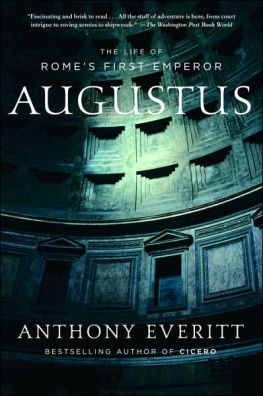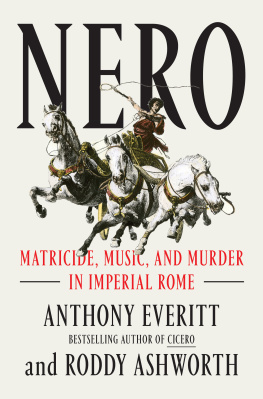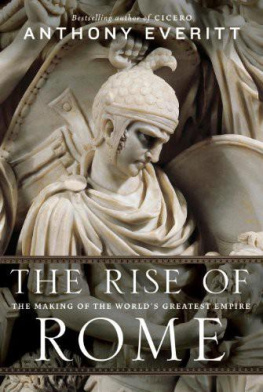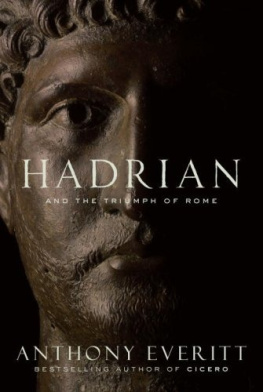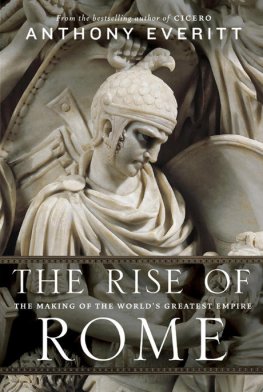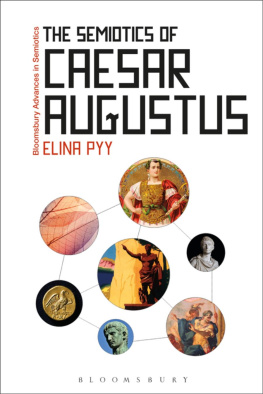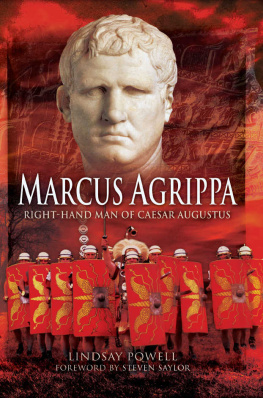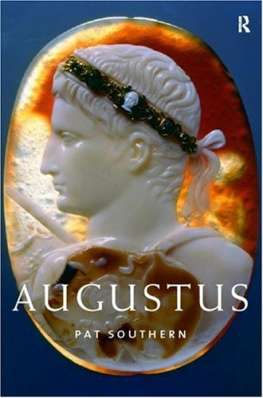ACKNOWLEDGMENTS
A generous grant from the Authors Foundation enabled me to visit places associated with Augustus career. I am most grateful to Dr. Irene Jacopi, director of the Palatine Hill and the Roman Forum, and architect Giovanna Tedone, both of the Soprintendenza per i beni archeologici di Roma, for taking the trouble to show me around the houses of Augustus and Livia (closed to the public for restoration).
The London Library, its helpful staff and its wide collection, greatly assisted my researches.
I am grateful to the following copyright-holders for reproduction permissions: Roman Forum reconstruction by John Connolly, akg-images; Palatine Hill, Photo Scala, Florence; Julius Caesar, Staatliche Museen zu Berlin; Mark Antony at Kingston Lacy, Bankes Collection, the National Trust; Sextus Pompeius, Hermitage Museum, Saint Petersburg; a Roman warship at the Gregorio Profano Museum, the Vatican Museums; water-color of Alexandria by J-P Golvin, George Braziller, Inc.; Cleopatra, Staatliche Museen zu Berlin; Octavia, Museo Nazionale Romano, Roma; Livia, Musei Capitolini, Roma, authors photograph; Augustus, trustees of the British Museum; Agrippa, Muse du Louvre; Ara Pacis at Rome, Alinari; Tiberius at the museum of Ventotene, authors photograph; Gaius Caesar, trustees of the British Museum; Agrippa Postumus, Musei Capitolini, authors photograph; Gemma Augustea, Kunsthistorisches Museum, Wien oder KHM, Vienna; Room of the Masks, Photo Scala, Florence; Augustus of Prima Porta, Alinari.
When quoting from Roman poets, I have used the following translations: James Michies Odes of Horace (Penguin Books, 1964: copyright David Higham Associates); Niall Rudds Satires and Epistles of Horace (Penguin Books, 1979); Peter Greens versions of Ovid, Erotic Poems (Penguin Books, 1964) and Poems of Exile (Penguin Books, 1994: copyright David Higham Associates); Cecil Day Lewiss Aeneid by Virgil (Oxford University Press, 1952); and E. V. Rieus Eclogues by Virgil (Penguin Books, 1949). I have used John Carters translations of Appian, The Civil Wars, and Cassius Dio, The Age of Augustus (Penguin Books, 1996 and 1987); D. R. Shackleton Baileys translation of Ciceros letters (Penguin Books, 1978); Aubrey de Slincourts Livy: The Early History of Rome; Propertius The Poems, translated by W. G. Shepherd (Penguin Books, 1985: copyright University of Oklahoma Press); Ian Scott-Kilverts selection from Plutarch, Makers of Rome (Penguin Books, 1965); Rex Warners selection from Plutarch, Fall of the Roman Republic (Penguin Books, 1958); Robert Gravess version of Suetonius, revised by Michael Grant, The Twelve Caesars (Penguin Books, 1979); and Michael Grants translation of Tacitus Annals, On Imperial Rome (Penguin Books, 1956). On occasion and for other prose authors I have either depended on the Loeb Classical Library or translated passages myself. The quotation from Alexandrian Kings can be found in C. P. Cavafys Collected Poems, translated by Edmund Keeley and Philip Sherrard (The Hogarth Press, 1975).
The battle maps follow Johannes Kromayer and Georg Veith, Heerwesen und Kriegfhrung der Griechen und Rmer, Munich, 1928.
ALSO BY ANTHONY EVERITT
Cicero: The Life and Times of Romes Greatest Politician
ABOUT THE AUTHOR
ANTHONY EVERITTs fascination with ancient Rome began when he studied classics in school and has persisted ever since. He read English literature at Cambridge University and served four years as secretary general of the Arts Council for Great Britain. A visiting professor of arts and cultural policy at Nottingham Trent University and City University, Everitt has written extensively on European culture and development, and has contributed to The Guardian and Financial Times since 1994. Cicero, his first biography, was chosen by both Allan Massie and Andrew Roberts as the best book of the year in the United Kingdom and was a national bestseller in the United States. Anthony Everitt lives near Colchester, Englands first recorded town, founded by the Romans, and is working on histories of ancient Rome and Greece for teenagers.
INTO THE FUTURE
Making a show of reluctance before the Senate, Tiberius assumed full powers and authority. Broadly, the new emperor maintained Augustus policies. However, the divine family became increasingly dysfunctional. Livia, or Julia Augusta as she now was, got on badly with her son once he became emperor. Although he admired her sagacity, he was irritated by the fact that she was credited with having made him emperor. In A.D. 26, Tiberius abandoned Rome for Capri off the Bay of Naples, where he spent the rest of his reign; his mother was probably one of the reasons for his second and final self-exile.
Germanicus was given a commission in the east, but died in A.D. 19 at the age of thirty-four, perhaps from poisoning (as usual, Livia was blamed). In A.D. 23 his contemporary, Tiberius son Drusus, also died; he may have been a victim of the emperors scheming favorite, Lucius Aelius Sejanus, but more probably of an epidemic raging in Rome that year.
The elder Julia did not long outlive her unforgiving father, dying in A.D. 14 at Rhegium. Postumus death removed her last hope of recall. According to Tacitus, Tiberius pitilessly let her waste away to death, exiled and disgraced, by slow starvation. He calculated that she had been banished for so long that her death would pass unnoticed.
The younger Julia never left her little island in the sun, and died some twenty years after her enraged grandfather had sent her there. Her lover, Silanus, was more fortunate. He was allowed to return to Rome in A.D. 20; Tiberius remarked quizzically that he was gratified that Silanus should return from his pilgrimage to far lands.
As for Ovid, Tiberius and Livia turned a deaf ear to his pleas for a reprieve. He cultivated the young Germanicus, but to no avail. In A.D. 17 he died among his barbarians at Tomis. He asked that he be buried near his beloved city, Rome, and one can hope, but without much confidence, that this last wish was granted.
Livia died in A.D. 29 at the considerable age of eighty-six. Tiberius outlasted her only by eight years, and expired old and lonely in his island retreat in A.D. 37. He was alleged to have spent his last years engaged in elaborate pedophiliac pursuits.
Germanicus son Gaius, nicknamed Little Boots, Caligula, by the troops when he was a small child, succeeded to the purple. Although intelligent, Caligula made poor decisions and almost certainly suffered from severe mental illness. Unkind gossip had it that he wanted to make his favorite horse a consul. He played practical jokes on his guards, who eventually lost their sense of humor and assassinated him, in A.D. 41.
For many years Drusus lame son, Claudius, continued to be ignored. He lived quietly and lazily, moving between a suburban mansion and a villa in the country. Augustus left him the insulting sum of four thousand sesterces in his will, and Tiberius declined to employ him. He divided his time between drinking and gambling with low-life acquaintances, and writing copiously. He published an autobiography, a defense of Cicero, and an authoritative history of the Etruscans.
Claudius was more or less forgotten until brought to court by the emperor Caligula, who treated him as an unpaid clown. When Caligula was assassinated, Praetorian Guardsmen found Claudius hiding behind a curtain in the palace, took him to their camp, and hailed him as emperor. A nervous Senate agreed.
To general surprise, Claudius turned out to be rather a good emperor. He annexed the remote island of Britannia to the Roman empire. Despite the fact that the long dead Livia had made his early life a misery, he generously arranged for her deification.
Next page
